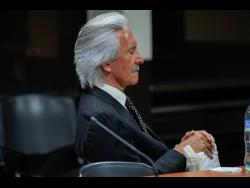When Guatemalan journalist José Rubén Zamora returned to his home after more than two years in prison without a conviction, he found it empty. He said it smelled of abandonment after his family fled the country, fearing they would face his same fate.
On Monday, one week after his release, Zamora discussed his own uncertain future in an interview with The Associated Press under the shadow of efforts to keep him behind bars and his concern for other journalists that do the kind of investigative work he did.
Not only have Guatemalan journalists — including eight from the outlet El Periódico that he founded — been forced into exile under threat of prosecution, but those who remain wrestle with the fear that if they investigate “they can end up in jail,” Zamora said.
Thrust into the spotlight, the 68-year-old journalist is shy, not keen to be the target of news.
He said he can still feel the aftermath of imprisonment in his bones, and also in his day-to-day life after funding his legal defense forced him to sell his belongings, only skating by through support from his children.
“Frankly, the feeling of not having any money, that is mine, is complicated and I don’t have the means to get around,” he said.
The interview comes after a long journey for Zamora, who has spent the past three decades working as a journalist. Twenty-four of those years were as president of El Periódico, the news organization he founded to investigate corruption in Guatemala.
It’s a dangerous topic to investigate in a country like Guatemala, where the Attorney General’s Office raided electoral facilities, seized and opened ballot boxes and targeted the Seed Movement party of now-President Bernardo Arévalo in an effort to keep him from taking office.
To this day, Zamora believes it was his paper’s investigative work that led him to be targeted by prosecutors. In particular, it was his pointed criticism of former President Alejandro Giammattei and his ally, current Attorney General Consuelo Porras, who was sanctioned by the United States for allegedly obstructing corruption investigations.




